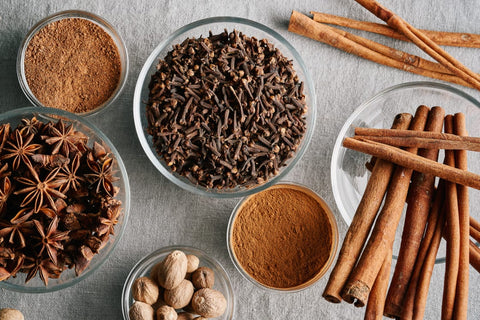Many people associate undressed salads and unseasoned chicken with “health,” but eating nutritious foods doesn’t have to be boring. In fact, keeping your meals devoid of flavor actually limits their potential benefits.
According to nutritional psychiatrist Uma Naidoo, M.D., utilizing spices and herbs is a surprisingly easy way to increase the nutritional value of a dish.
“In the U.S., we rarely think about these ingredients in terms of nutrition,” Naidoo says. “Salt and pepper have been widely used as a main seasoning, but the benefits packed in herbs and spices are mind-blowing.”
The health benefits of 4 herbs and spices.
These sometimes overlooked kitchen staples are “powerful in nutritional psychiatry,” Naidoo tells mbg, as they have been proved to support both mental and physical health. Here are a few of her favorite herbs and spices, plus their potent benefits.
Turmeric
Benefits: Turmeric, a golden Ayurvedic spice made from the root of Curcuma zedoaria, “is highly anti-inflammatory and may improve anxiety,” Naidoo says.
Uses: Take turmeric as a supplement, add it to a golden latte, or use it to marinate chicken.
Saffron
Benefits: According to Naidoo, saffron (a vibrant red spice from the flower of Crocus sativus) has antidepressant benefits. Plus, it may have aphrodisiac qualities.
Uses: Add saffron to jasmine rice for a delightfully aromatic grain; pumpkin soup; a warm, spiced milk; or even a DIY face mask.
Rosemary
Benefits: Along with supporting healthy blood sugar levels and providing antioxidative effects, Naidoo says rosemary can also improve memory and cognition.
Uses: Seasoning olive oil with rosemary makes for an even more flavorful and nutrient-dense cooking fat. It’s a lovely garnish for hearty dishes, like vegan pot roast or Italian veggie stews. You may also find it in supplements.
Ginger
Benefits: “Ginger helps with digestion,” Naidoo says. In doing so, it’s also been shown to help soothe nausea and support overall gut health. It also contains anti-inflammatory properties.
Uses: Ginger is often found in gut-supportive teas, in sesame-ginger seasonings for veggies or protein sources, or blended into smoothies. When you’re not using the root, be sure to store it properly.
Bottom line.
Flavorless meals are not synonymous with health—they’re actually quite the opposite. Adding herbs and spices to food and drinks is a super-simple way to elevate their benefits. If you’re not doing so already, it’s time to crack into that spice cabinet.




